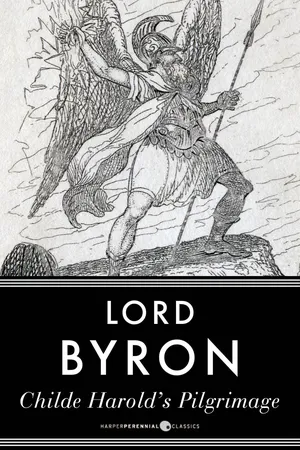
- 252 pages
- English
- ePUB (mobile friendly)
- Available on iOS & Android
Childe Harold's Pilgrimage
About this book
Childe Harold is a disillusioned knight in training when he decides to leave his life of idle pleasure behind and travel the world, visiting exotic foreign lands in search of new adventures.
Lord Byron wrote "Childe Harold's Pilgrimage" as a semi-autographical poem, and many of Harold's encounters were taken directly from Byron's experiences travelling Europe and the Middle East. Byron originally felt that the poem was too personal to publish, but eventually sent the first two cantos to print, which quickly propelled him to fame as a poet.
HarperPerennial Classics brings great works of literature to life in digital format, upholding the highest standards in ebook production and celebrating reading in all its forms. Look for more titles in the HarperPerennial Classics collection to build your digital library.
Tools to learn more effectively

Saving Books

Keyword Search

Annotating Text

Listen to it instead
Information
Canto the Fourth
Table of contents
- CONTENTS
- Preface (to the First and Second Cantos)
- Addition to the Preface
- Dedication
- Canto the First
- Canto the Second
- Canto the Third
- Canto the Fourth
- About the Author
- About the Series
- Copyright
- About the Publisher
Frequently asked questions
- Essential is ideal for learners and professionals who enjoy exploring a wide range of subjects. Access the Essential Library with 800,000+ trusted titles and best-sellers across business, personal growth, and the humanities. Includes unlimited reading time and Standard Read Aloud voice.
- Complete: Perfect for advanced learners and researchers needing full, unrestricted access. Unlock 1.4M+ books across hundreds of subjects, including academic and specialized titles. The Complete Plan also includes advanced features like Premium Read Aloud and Research Assistant.
Please note we cannot support devices running on iOS 13 and Android 7 or earlier. Learn more about using the app